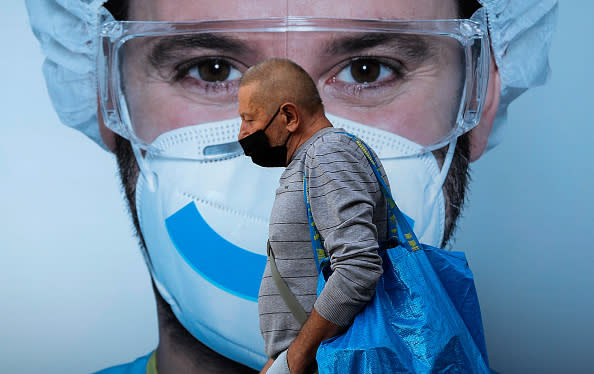'Tough weeks are coming': Europe on edge as second wave surges
Europe is awash in a second wave of coronavirus with the UK recording its highest number of daily cases since the pandemic began.
The UK recorded 6,634 new daily cases of COVID-19 overnight, according to government data, reflecting a second wave of infections sweeping through the country but also a much higher level of testing than during the first wave.
The number released on Thursday was up from 6,178 on Wednesday, itself a jump from 4,926 the previous day.

Earlier, Health Secretary Matt Hancock said the government estimated fewer than 10,000 people were becoming infected every day as opposed to estimated numbers of more than 100,000 during the peak of the first wave.
"(At the peak), we estimate through surveys that over 100,000 people a day were catching the disease, but we only found about 6000 of them and they tested positive," he said in an interview on Sky News.
"Now we estimate that it's under 10,000 people a day getting the disease. That's too high, but it's still much lower than in the peak."
Country flags new coronavirus rules after controversial policy
'Very concerning': Silent toll of coronavirus could cause 'third wave'
'Unbelievable' crowds at popular selfie spot ignore second wave horror
While testing capacity has increased dramatically since the first wave, the system has nevertheless been under strain, with many people reporting they were unable to get tests or had to travel long distances. Delays in getting results back have also led to criticism.
Public Health England said there had also been 40 new coronavirus-related deaths, up from 37 the day before.
While deaths are a lagging indicator, at the peak of the pandemic the UK was reporting more than 1000 deaths per day.
The country's death toll from COVID-19 currently stands at 41,902.

Spain’s infections pass 700,000
Spain's cumulative tally of confirmed coronavirus infections passed 700,000 as authorities warned of tougher times ahead in the densely-populated virus hotspot region of Madrid, which accounts for more than a third of hospital admissions.
The number of confirmed cases has spiked since the end of a countrywide lockdown in late June, adding 200,000 in less than a month, and now stands at 704,209 – the highest in western Europe.
Daily deaths are now around their highest levels since early May but well below the late March record of nearly 900.
To date, the country has registered 31,118 COVID-19 deaths.

Authorities in Madrid, which has the highest share of hospital capacity occupied by COVID-19 patients and about 500 people hospitalised a day this week, have imposed a partial lockdown in districts with high contagion rates, and could announce more measures on Friday (local time), according to local officials.
"Tough weeks are coming in Madrid. We must act with resolve to bring the pandemic under control," Health Minister Salvador Illa told reporters before meeting regional officials.
Mr Illa has said the second wave of infections in Spain has a lower intensity and velocity than the first one, the high numbers owing mostly to mass testing that now allows authorities to detect six or seven cases out of 10 as opposed to one in 10 a few months earlier.
"Although the figures may seem similar, they are not," Mr Illa told parliament earlier this week.
Education Minister Isabel Celáa also said on Thursday the reopening of schools over the past two weeks had not led to any significant increase in infections, and only 0.73 per cent of all classes have had to be quarantined so far.

French hospitals under pressure
French health authorities say the number of people hospitalised for COVID-19 has gone beyond the 6,000 threshold, a first since July 27.
The data indicates there are still more than 1000 patients in intensive care units, levels not recorded since the beginning of June.
France has reported soaring COVID-19 infections since the beginning of the month.
The renewed strain on the country's hospital system has prompted the government to announce extra restrictive measures on Wednesday (local time), mainly in big cities, to contain the disease.
Italy introduces compulsory masks
Wearing a mask outdoors has become compulsory in certain parts of Italy as local authorities respond to rising coronavirus caseloads.
In Campania, the southern region including Naples, people must wear masks at all times when outside, Regional President Vincenzo De Luca wrote on Facebook Thursday.
The rule is valid until October 4 and is not applicable to children under 6, nor to people eating in bars and restaurants or practising sports or exercising, he said.

Similar rules were adopted late on Wednesday for the historical centre of Genoa, a northwestern port city known for having tiny alleys in which distancing is harder to respect.
The Liguria region, which has Genoa as its capital, also extended until Sunday tougher restrictions including school closures for the city and province of La Spezia, a virus hotspot.
In the rest of Italy masks have to be worn outside from 6pm to 6am in places where physical distancing is not possible, like public squares where people assemble at night.
The rule has been in place since mid-August.
After being overwhelmed by the pandemic in March and April, Italy has recently won plaudits for being more successful than other European countries in keeping contagion rates under control.
However, virus cases have been increasing since mid-July.
On Thursday, the health ministry reported 1,786 new infections compared to a low of 114 on July 14.
Total infections reached 304,323 and the overall death toll rose by 23 to 35,781.
Numbers are rising because Italy is testing more people.
with Reuters and DPA
Do you have a story tip? Email: newsroomau@yahoonews.com.
You can also follow us on Facebook, Instagram and Twitter and download the Yahoo News app from the App Store or Google Play.



